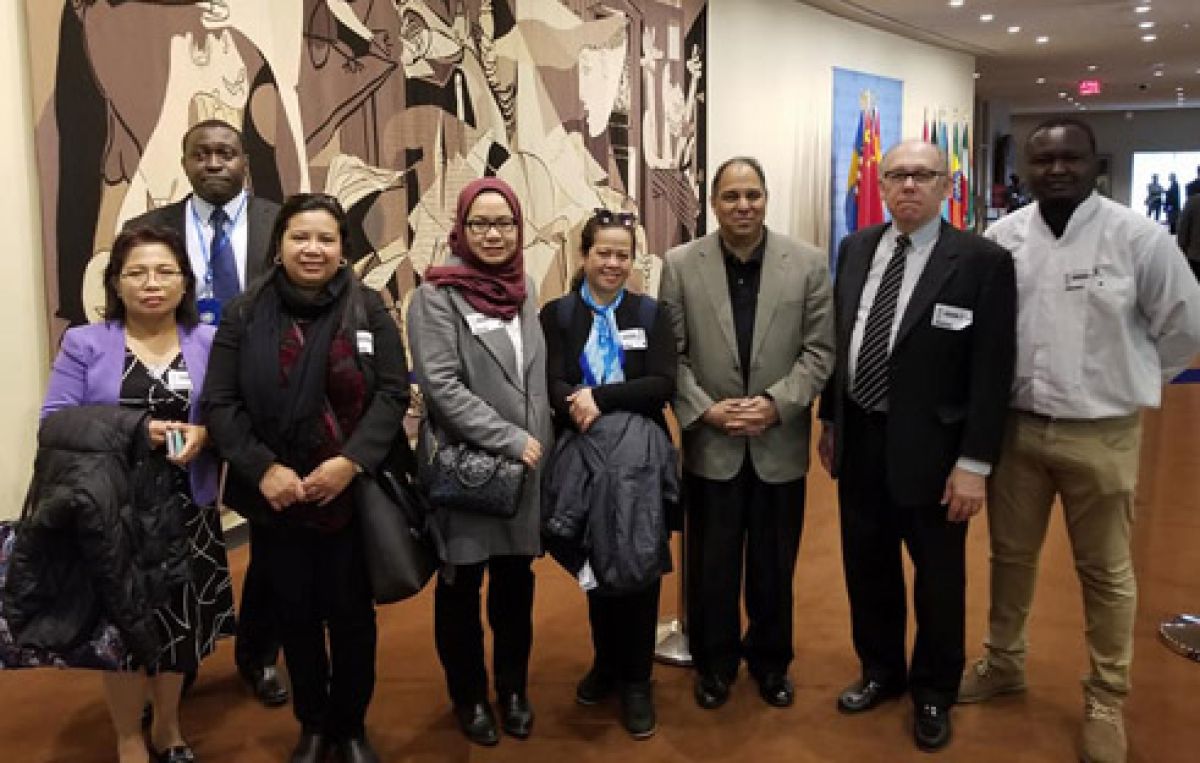Interfaith Peacebuilding and the UN

NEW YORK – One of the most popular classes this semester at the Unification Theological Seminary (UTS) New York City campus is a new course being taught by Dr. Frank Kaufmann (UTS’79) entitled: “Interfaith Peacebuilding and the United Nations” (UN).
Designed as an “intensive,” the course covers the content of the program in five weeks instead of the usual 15 weeks, with each class lasting for nine hours. Each class is broken up into two halves; usually classroom meetings in the morning and afternoon visits arranged to meet with different UN and Non-Governmental Organizations (NGOs). The class is designed to fulfill Dr. Kaufmann’s intention outlined in the syllabus, which states: “This course introduces students to the close relationship between the mission of the United Nations and the vision and purpose of interfaith.”
There were a total of seven students in the class – four women and three men. All of the women are from the Philippines; one being an Orthodox Muslim. Each of the women has expressed a desire to start an NGO either here in the U.S. or in their home country when they’ve finished their studies at UTS. Two of the three men are from Burkina Faso, each with a Roman Catholic background; the third, an American, is a Unificationist and a former missionary.
Each week the class met with ambassadors or representatives of different organizations workingin various capacities at the UN. The class met with Genie Kagawa, Chair of the Committee for Spirituality, Values and Global Concerns (CSVGC); Ryan Koch, Director, New York Office, Public and International Affairs of the Latter Day Saints NGO at their site at 65th and Broadway; Sharon Hamilton Getz, past Chair of CSVGC and member of a number of related spiritual NGOs; Dileep Guruji, of the World Yoga Community, and; Julia Grindon-Welch and Sabita Geer of Brahma Kumaris.
According to Dr. Kaufmann, “students… visit and learn from new and different UN and NGO leaders, followed by traditional classroom instruction and group work. This will allow students to build up unique knowledge and expertise in this vital, and needed dimension of interfaith, namely how interfaith is related to broader efforts for peace.
”As this was the first time the course was offered, the students were initially unsure as to what to expect. Judging from their responses, however, their uncertainties quickly vanished and their highest expectations were met.
“We all came to the class knowing little or nothing about how NGOs are formed and how they function,” said American George Glass. “None of us had any real understanding of how religious or interfaith NGOs worked with one another and the UN. Over the five weeks of the course, however, we have learned much about the ways of the UN and how NGOs operate.
“In order for us to have the most impactful experience, Dr. Kaufmann arranged meetings with various groups and speakers. Each speaker spent nearly an hour-and-a-half with us, giving us practical information on the work of their NGO as well as answering our numerous questions about the underlying motivations for their work.”
Kinda Zongo, one of the two students from Burkina Faso, was also unsure as to the course structure, and whether or not it would be a learning as well as fulfilling experience.
“By taking this course with Dr. Kaufmann and considering the style, I was wondering exactly what I will learn in five weeks of intense visits,” said Kinda. “But, in the field, I was surprised by the depth of knowledge we gained from these different UN-affiliated NGOs. By combining field visits and class discussion, this course opened our eyes to the actions that NGOs lead concretely in the field and in relation with the interfaith peace building and the United Nations.”





